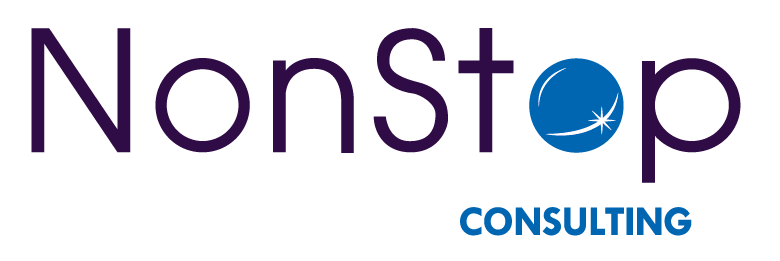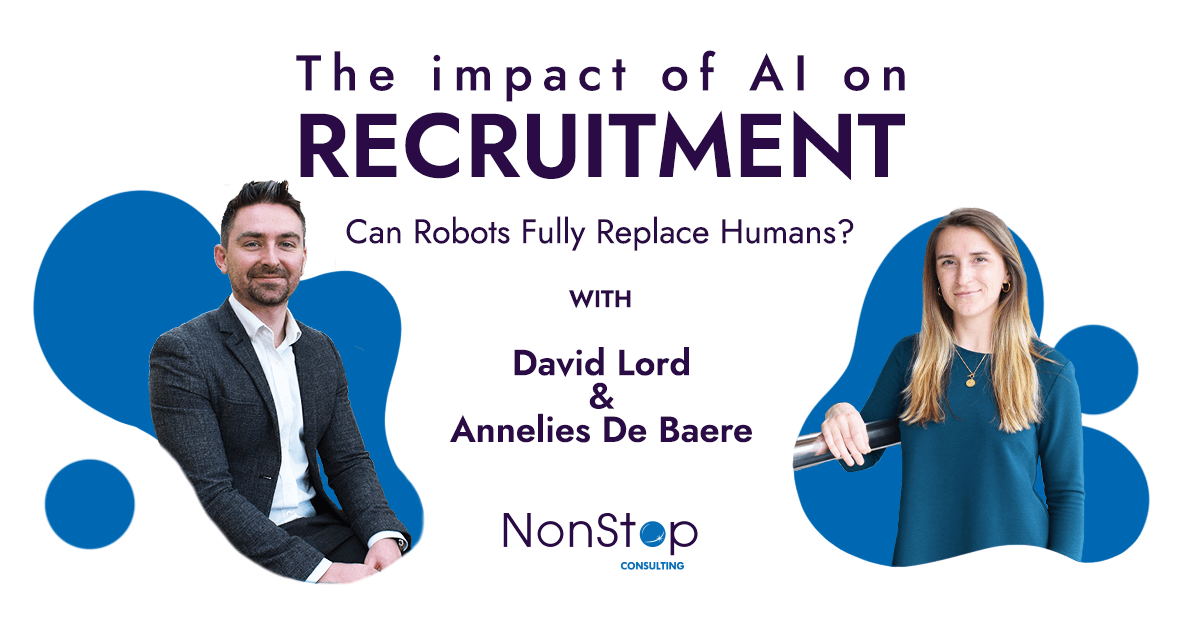With the overwhelming rise in popularity of ChatGPT and other AI tools, the question of what jobs the robots are coming for is understandably once again at the forefront of minds and media right now.
Especially so since IBM announced it would look to pause hiring, particularly for back office roles, with the view that 7,800 roles could be replaced by AI in the coming years.
Recruiters and talent acquisition and HR specialists all play a vital role in managing one of a company’s most valuable assets: its people. But can a lot of that also be replaced with AI?
“Regardless of what IBM or other companies are planning, we’d argue when you’re dealing with people, you’ll always need other people in the process,” says NonStop Director David Lord.
Adoption of technology in recruitment
We’ve seen from the decades of digital change historically that greater efficiency and lower costs can be achieved by implementing new tools and technology and it’s true that the recruitment industry has long since used technology to help determine which applicants might be the best fit for particular roles, he says.
One of the earliest adoptions of AI in the recruitment space is arguably the CV screening tools that filtered candidate suitability on keywords contained in those documents. Such tools not only save recruiters and hiring managers time in reducing the number of applications to screen, but also helped reduce unconscious bias in the hiring process by evaluating the applicants purely on their skills and experience.
Then we saw AI applied to candidate sourcing and attraction processes too with advanced tools to essentially supercharge job ads to get them in front of the right candidates rather than just the candidates who happen to be browsing a particular job ad on any one day.
AI applied to online interviews, meanwhile, gave us the ability to analyse candidate body language, facial expressions, speech patterns, and likely more, to build a better picture of who they are.
More recently we’ve seen AI applied to websites to deliver targeted messages to specific visitors based on publically available information in their IP address, for example. Chatbots, some of which claim to be linked with Chat GPT, can help guide candidates through a website and/or application process, potentially even start interviewing them too.
Delivering the best candidates
While outsourcing these tasks to technology can indeed save time for recruiters, HR, and talent acquisition professionals, does it really deliver the best candidates?
According to NonStop Associate Director, Annelies De Baere, based on the way the tools were programmed or how their algorithms work, candidates with certain skills, experience, or education slightly outside the key requirements might be overlooked, even though they could well do the job in question. An experienced recruiter, on the other hand, could spot that and make a different decision, especially when it comes to transferrable skills.
“So on the one hand, we have this tool that can help reduce bias in our processes, but potentially at the cost of empathy. The key to harmonising these aspects will be in training and programming the tools, and then consistent monitoring as the hiring market develops, yet training in a way that is also devoid of bias so the tool doesn’t pick that up,” she says.
Ultimately the outputs produced by AI can help improve decision making and automate repetitive tasks to streamline recruitment processes and make them more efficient, David adds.
Other uses of AI in the recruitment process
Moving forwards, where else might AI lend a hand to create a more efficient recruitment process?
Given ChatGPT works with language, we put it to the test writing a job ad for us. After a bit of back and forth, we got a decent job ad.
“While we would argue the AI ad outputs are better than probably half of the job ads on the larger and more common job boards, the key to standing out will come down to elevating that AI output with your own content, or learning specific prompts to get the tool to adapt the copy for you,” Annelies says.
Something that will be interesting to watch for the future is how Google and other search engines prioritise AI-created content and therefore what that can do for SEO and the visibility of those job ads. For now, Google has confirmed it will continue to prioritise quality content, regardless of how it was created.
“In addition to job ads, David says, “I think there are going to be some potentially very interesting advancements in interviewing technology that could eventually see at least some of the earlier stage interviews conducted fully by AI, but I still stick my point earlier that there will always be a need for humans in the process”.
AI for job applicants
What about on the other side? The applicant? Could ChatGPT and other AI tools revolutionise the job search process too?
According to a recent report by Resume Builder, 78% of applicants who used ChatGPT landed an interview and 59% got the job. Almost half of the survey respondents said they’d used ChatGPT to write CVs and/or cover letters.
Even before ChatGPT became a worldwide talking point, AI was being used to automate the application process with at least one tool adapting CVs and cover letters to automatically apply for matching jobs as and when they came online without the candidate having to lift a finger.
There are also AI-powered CV creators; tools to review a candidate’s CV and cover letter to make it more readable by ATS platforms; job boards that put the candidate first to match skills, experience, and career aspirations to jobs then highlight their profiles to the relevant recruiters; interview practice tools; salary comparison tools that also give negotiation training; and much more.
According to David, ChatGPT itself could be an easy yet powerful tool to help candidates prepare for job interviews.
“One of the pieces of advice we always give candidates is to thoroughly research the company and job they are applying for and ask specific questions in their interviews. Given the way ChatGPT works, I expect this to be a great tool to help the candidate with their research, and potentially even help them practice the questions,” he says.
Limitations of AI in recruitment
Unfortunately there are also some cases which could see AI potentially limited, or even banned, in recruitment processes which will be worth keeping an eye on.
Earlier this year, Bloomberg reported that major banks in the US were cracking down on the use of ChatGPT.
Then it was banned in Italy by the country’s data protection authority.
Some UK universities also banned it.
Then there was the open letter from nearly 30,000 people including scientists, tech entrepreneurs, even Elon Musk, who co-founded OpenAI, calling for a pause in machine learning until the impact and risks are more fully considered.
In a recruitment-specific setting, two years ago there was a new law passed in New York limiting the use of AI in hiring processes.
The need for a human element remains
As mentioned above, while technology, including AI, can help streamline processes and make them more efficient, for now at least we still see a need for a human element in the recruitment process, David says.
“As a candidate, your CV, cover letter, portfolio, and any other materials need to reflect who you are and what you want from your career rather than a list of AI-generated skills. Both sides in the interview process also need to be assessing each other for things like cultural fit, which I don’t think AI can really do just yet.
“Ultimately until we’re all working directly with robots, their role in the recruitment process will continue to be limited. At the end of the day, people still want to speak with people.”
What’s next for AI in recruitment? Watch this space….





